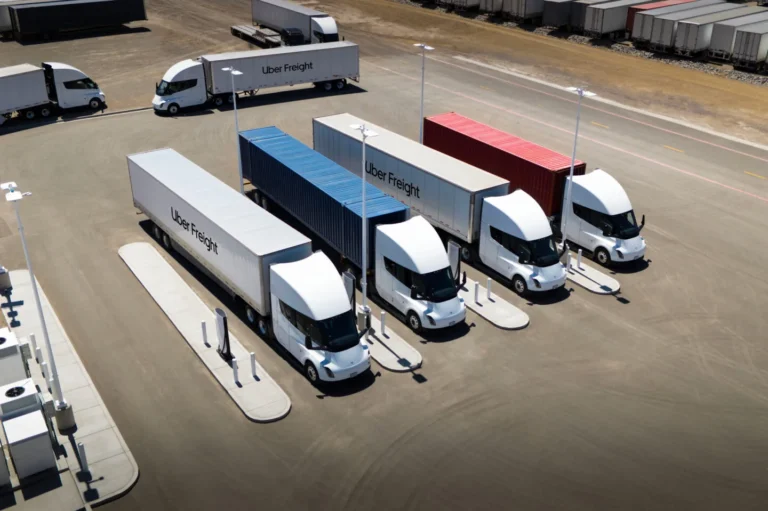Uber Freight and Tesla have announced a new program as part of their strategic partnership to accelerate the adoption of electric trucks in the transportation industry.
Uber Freight and Tesla have announced a new program as part of their strategic partnership to accelerate the adoption of electric trucks in the transportation industry. The “Dedicated Electric Vehicle Fleet Accelerator Program” aims to encourage carriers to switch to electric trucks by offering subsidies on vehicle costs and guaranteeing loads through the Uber Freight network. This program includes Tesla’s Class 8 electric Semi trucks, along with a charging infrastructure specifically designed for these vehicles. The collaboration between the two companies seeks to address one of the sector’s main challenges: the transition to a zero-emissions truck fleet.
The high cost of electric trucks is one of the primary reasons why most carriers have yet to make the switch to electric vehicles in their fleets. Therefore, the program’s main goal is to alleviate the economic barriers carriers face when considering the purchase of electric trucks. With the backing of Uber Freight, the program aims to provide a more accessible path for carriers by helping to reduce the upfront hardware costs and providing access to specific routes that align with a growing network of charging stations.

Uber Freight: towards a zero-emission future
A recent study published by Transport Topics revealed that battery-electric Class 8 trucks in the U.S. have seen an increase in price, while in Europe, the price of these vehicles has decreased significantly. Between 2020 and 2025, the average price of a Class 8 electric truck in the U.S. increased by 27%, whereas in Europe, the price dropped by 32%. This contrast reflects differences in the transportation markets and the adoption of clean energy technologies, which could complicate the competitiveness of electric trucks in the U.S.
Despite these challenges, Uber Freight remains committed to its mission of driving an electric truck fleet to transform the supply chain towards a zero-emissions future. The company has stated that the biggest obstacle remains the initial cost and the predictability of investment, an added challenge in a market still grappling with declining rates in contracts and spot rates. However, Uber Freight believes that subsidies on truck costs and load guarantees will help carriers overcome these economic barriers, accelerating the shift to clean freight transportation.
As part of the program, participating carriers will receive a series of benefits, including a subsidized purchase price for Tesla Semis and load guarantees on specific operations within the Uber Freight network. The program not only focuses on truck sales but also on ensuring the operational viability of these vehicles, which is crucial for carriers who need to secure consistent loads and efficient routes to maximize the profitability of their investment.

Uber Freight and Tesla accelerate the electric truck industry
The launch of the Tesla Semi has been marked by several delays, complicated by the end of federal incentives for electric vehicles in the U.S., which has added uncertainty to the large-scale production of the Semi. Despite these obstacles, Tesla remains committed to the project and plans to begin large-scale production in 2026, with the capacity to manufacture up to 50,000 units annually at its Reno, Nevada plant.
Uber Freight and Tesla have already conducted a pilot test of the acceleration program using pre-production Semi trucks. During this two-month trial, the trucks traveled a total of 12,377 miles, with an average energy consumption of 1.72 kWh per mile. These results show that the energy consumption of the electric trucks is below the promised threshold of 2 kWh per mile, reinforcing the viability of electric trucks in the freight transportation market.

FORMULA 1 and the AI That Could Transform Transportation in the U.S.
The artificial intelligence system that Formula 1 implemented to monitor every car on every turn is opening the door to new applications in trucking, logistics,

$170 billion at stake: 1,500 companies demand tariff refunds
Companies have challenged the global tariffs imposed by President Donald Trump, asking federal courts to reactivate proceedings to begin the refund process. The companies that

In brief: enforcement measures target speeding, CDL training gaps and more
Major enforcement actions across the U.S., including speeding, CDL fraud, and chain violations Colorado launches Speed Enforcement Program The Colorado Department of Transportation (CDOT) has

Chinese Vehicles Raise Espionage and Remote Sabotage Concerns
Investigations into Chinese technology in connected vehicles warn of espionage risks, massive data transmission, and potential remote access vulnerabilities that concern U.S. transportation and security

Between the Court and the Fed: the market redefines its roadmap for 2026
Trade policy in limbo as markets price in 2026 rate cuts and Supreme Court strikes down Trump tariff plan. In the latest episode of the

New 10% U.S. import tariff takes effect amid legal and market uncertainty
The implementation of these new tariffs has generated global uncertainty among exporters, increasing confusion around U.S. trade policy. The United States has implemented a new
All content and original artwork, unless otherwise noted, is protected by copyright. Saint George uses certain images under license from various licensing vendors for this purpose. Any unauthorized commercial reproduction or distribution of copyrighted materials is prohibited.
